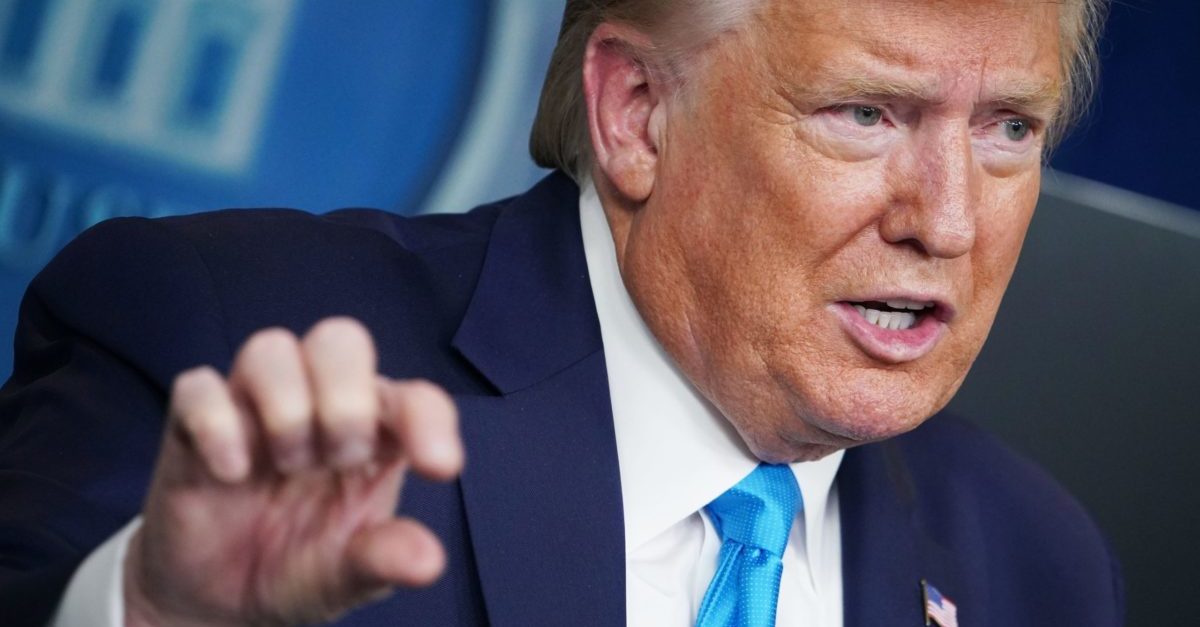
Attorneys for President Donald Trump on Wednesday filed court documents confirming that that he plans to continue to fight the subpoena for his financial documents issued by Manhattan District Attorney Cy Vance. The submission, filed jointly in the Southern District of New York (SDNY), summarizes the legal arguments both parties plan to make after the U.S. Supreme Court ruled that the president is not entitled to “absolute immunity” from state criminal investigations and kicked the case back down to the lower court.
Trump’s legal defense team stated its intention to rely on four central arguments as the district court proceedings begin anew.
First, that the subpoena from Vance’s office to Mazars USA, the president’s personal accounting firm, amounts to an “arbitrary fishing expedition” and is “not a properly tailored grand-jury subpoena.”
Second, that the subpoena was “motivated by a desire to harass” president Trump. Third, the attorneys said the president may argue that the subpoena was designed to “manipulate” Trump’s policy decisions or “retaliate” against him for official acts while in office.
The fourth and final argument the president plans to assert is that complying with the subpoena would “impede” his ability to fulfill his constitutional duties (see here for more on where these arguments are coming from).
The attorneys then described the likely protracted legal battle over the details of the subpoena.
“The parties likely will disagree about the appropriate scope of discovery. If those disputes cannot be resolved, then they can be adjudicated through motions practice. But there can be no reasonable disagreement that a factual record will need to be developed,” Trump’s attorneys argued:
Thus, both the Court and the President are entitled to know, inter alia, “why the State wants the information; why and how much the State needs the information, including whether the State could obtain the information elsewhere; and whether compliance with the subpoena would unduly burden or interfere with a President’s official duties.” Id. Indeed, it would be impossible for the President to fairly litigate his claims without this information. The President should not be required, for example, to litigate the subpoena’s breadth or whether it was issued in bad faith without understanding the nature and scope of the investigation and why the District Attorney needs all of the documents he has demanded.
The DA’s office, on the other hand, accused the presidents attorneys of misrepresenting the Supreme Court’s opinion by claiming Trump is still entitled to a “heightened standard” for issuance of subpoenas, arguing he is actually “in nearly the same situation with any other individual.”
“The President’s proposal attempts to elide that standard; indeed, it expressly invites this Court to conduct a heightened-scrutiny inquiry drawn from the concurring opinion that was utterly rejected by the majority decision. Equally important, it overlooks the fact that he has already advanced substantially similar allegations in the Amended Complaint, which this Court rejected,” Vance responded.
Vance also claimed that all four of the president’s proposed arguments were summarily rejected by the Supreme Court earlier this month.
University of Texas law professor Steve Vladeck noted that Trump’s legal team is likely to lose on the merits of their arguments, but ultimately may succeed in delaying until after November’s election (some believe that won’t necessarily happen).
“It’s truly alarming just how effective a tactical strategy of ‘delay, delay, delay, delay some more’ can actually be,” CNN legal analyst and former federal prosecutor Elie Honig remarked.
Read the full filing below:
7 15 20 Trump v Vance Status Report by Law&Crime on Scribd
[Image via MANDEL NGAN/AFP via Getty Images]